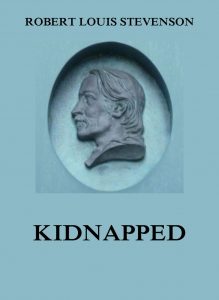Kidnapped – Robert Louis Stevenson
In writing this, his third, book for boys, Stevenson turned from scenes and characters of pure invention to real people and places of a minor incident of Scottish history. The Appin murder, which provides the turning point of the story, has thereby become known to thousands who had not before heard of Alan Breck or the wrongly condemned James Stewart. The Highlands, in their unsettled state after the ’45, are made the setting for the adventures of the sober David Balfour, in whose prim ways and staid talk Stevenson found the contrast with the rebel spirits of the Highland Jacobites. Save for the change of year from 1752 to 175 1, he keeps very close to the historical facts, as may be seen from the outline of these latter in the chapter on the Appin murder on another page. A single episode of this kind, grafted on to imaginary adventures, just suited Stevenson’s genius for romantic incident, while it did not lay upon him the physical strain of managing a full stage of historical characters in the manner of Dumas or Scott. Thus Kidnapped has the features of both an historical romance and a boy’s book of adventure. In blending the two Stevenson satisfied his young readers, and compelled the admiration of such non-adventurous bookmen as Matthew Arnold and Henry James.

Kidnapped
Format: Paperback.
Kidnapped.
ISBN: 9783849676346.
Available at amazon.com and other venues.
Biography of Robert Louis Stevenson (from Wikipedia):
Robert Louis Balfour Stevenson (13 November 1850 – 3 December 1894) was a Scottish novelist, poet, essayist, and travel writer. His most famous works are Treasure Island, Kidnapped, Strange Case of Dr Jekyll and Mr Hyde, and A Child’s Garden of Verses.
A literary celebrity during his lifetime, Stevenson now ranks as the 26th most translated author in the world. His works have been admired by many other writers, including Jorge Luis Borges, Bertolt Brecht, Marcel Proust, Arthur Conan Doyle, Henry James, Cesare Pavese, Emilio Salgari, Ernest Hemingway, Rudyard Kipling, Jack London, Vladimir Nabokov, J. M. Barrie, and G. K. Chesterton, who said of him that he “seemed to pick the right word up on the point of his pen, like a man playing spillikins”.
(The text of the last section was taken from a Wikipedia entry and is available under the Creative Commons Attribution-ShareAlike License.)
Publisher’s Note: This book is printed and distributed by Createspace a DBA of On-Demand Publishing LLC and is typically not available anywhere else than in stores owned and operated by Amazon or Createspace.
